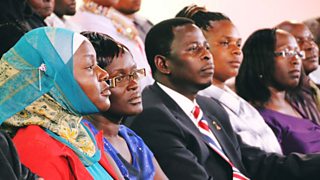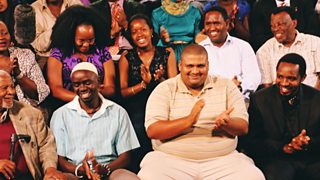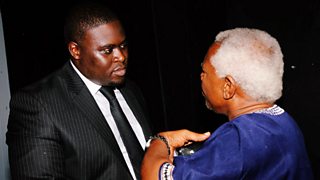Speaking the same language?
Jackie Christie
Senior Production Manager, Kenya and Somalia
Tagged with:
With more than 50 episodes under our belt, the team on Kenyaβs TV and radio debate show Sema Kenya (Kenya Speaks) has the showβs many production tasks down to a fine art. But that doesnβt mean itβs always smooth sailing. Take, for example, the process of inviting panellists on to the programme. Μύ
For our latest episode, a special show to mark 50 years of independence in Kenya, the producers drew up a fabulous wish list of potential participants: scholars, advocates, artists and opinion leaders, freedom fighters, politicians, writers and activists. People who had shaped Kenyaβs political and social history, and people who had strong opinions about its future as well as its past.Μύ I was excited just reading the list.Μύ
But, of course itβs one thing to make a wish list, itβs another to execute it.Μύ So with a few weeks to go, the producers and researchers hit the phones.

Sema Kenyaβs studio audience watch the debate during a special episode to mark 50 years of Kenyaβs independence. In the centre: Evans Gor Semelang'o, Chair of the Youth Enterprise Development Fund.
Opening gambit
First comes the mheshimiwa opener.Μύ This means βhonourableβ in Kiswahili and recognises a personβs status coupled with an added dose of flattery for good measure.
Next comes the explanation about the programme and why this personβs contribution in particular will add special value.Μύ After this the location β Sema Kenya travels to different counties around the country most weeks.Μύ
Once the logistics are out of the way, the killer question is dropped into conversation: βAnd you know, of course, the programme is in Kiswahili?βΜύ
At this point any one of a number of responses occur: outright refusal followed by silence as the producer or researcher listens to the previously enthusiastic guest frantically back-pedalling; reassuring noises from the producer about the quality of the panellistsβ Kiswahili; and at the end of the call, if the producer has been successful, the guest accepts and the producer does their βhappyβ dance.
But for our special independence programme, we learned that a large percentage of potential guests didnβt feel confident enough speaking Kiswahili to participate.
National language?
The lingua franca of business in Kenya is overwhelmingly English despite the fact that Kiswahili is taught in schools as a second language.
A Kenyan MP recently tried to have Kiswahili declared the official language in government offices and in the national assembly. But it was found that only 40% of Kenyans could speak it competently.
Saying that, most Kenyans speak a minimum of three languages β their mother tongue, Kiswahili and English. The young hipsters of Nairobi also cannibalise English and Swahili to make their own language β sheng. In rural Kenya people also speak many dialects of local languages.Μύ
50 years on

On the far left, former Mau Mau freedom fighter Gitu wa Kahengeri; on the far right photographer, human rights campaigner and activist Boniface Mwangi; and on second row, far right, Leonard Mambo Mbotela, a veteran of Kenyan journalism.
Instead of the usual format where audience put questions to a panel, we decided to allow people time to reflect on whether Kenya is where they hoped it would be after 50 years of self-rule. Kenyans from all over the country - including Mau Mau freedom fighters, veterans from the struggle for multi-party democracy, rap artists and outspoken bloggers β took part.
Juliani, a well-known musician, was seen consulting a Kiswahili dictionary before the show, so keen was he to express himself well.
Μύ

Johnson Sakaja Chair of TNA, the ruling party in Kenya, talks to an audience member from the coast who recalls seeing the Union Jack lowered and the Kenyan flag raised in Uhuru Park in 1963.
Lingua franca
Having lived in Kenya for several years I often reflect on why my spoken Kiswahili is almost non-existent. Once Kenyans realise I am British, they waste no time practicing their generally excellent English on me. Of course a bigger issue is that I am no linguist and being based in the capital Nairobi it’s much easier to make myself understood in English than weak Kiswahili.
Perhaps this is the same challenge our potential panellists face?
It doesn’t necessarily follow that Kenyans are losing touch with their roots and culture because they struggle to speak the national language. In my experience Kenyans are enterprising and dynamic, quick to latch on to what they can use to get ahead. If this is English, then so be it.
It’s not surprising then that more and more people I meet, from street hawkers to businessmen, are now enrolling on courses to learn Mandarin.
Related links
Follow ΒιΆΉΤΌΕΔ Media Action on and
